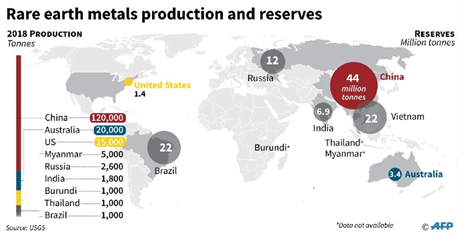Ahmedabad
(Head Office)Address : 506, 3rd EYE THREE (III), Opp. Induben Khakhrawala, Girish Cold Drink Cross Road, CG Road, Navrangpura, Ahmedabad, 380009.
Mobile : 8469231587 / 9586028957
Telephone : 079-40098991
E-mail: dics.upsc@gmail.com

Minerals security partnership
News: There is growing concern in the Government over India not finding a place in the Minerals Security Partnership.
About:
• Minerals Security Partnership is an ambitious new US-led partnership to secure supply chains of critical minerals, aimed at reducing dependency on China.
• The US and 10 partners- Australia, Canada, Finland, France, Germany, Japan, the Republic of Korea (South Korea), Sweden, the United Kingdom, and the European Commission have come together to form the MSP.
• The new grouping is aimed at catalyzing investment from governments and the private sector to develop strategic opportunities.
• The new grouping, industry insiders say, could focus on the supply chains of minerals such as Cobalt, Nickel, Lithium, and also the 17 ‘rare earth’ minerals.
• Demand for critical minerals, which are essential for clean energy and other technologies is projected to
expand significantly in the coming decades.
What are Rare earth elements?
• The 17 rare earth elements (REE) include the 15 Lanthanides (atomic numbers 57 — which is Lanthanum — to 71 in the periodic table) plus Scandium (atomic number 21) and Yttrium (39). REEs are classified as light RE elements (LREE) and heavy RE elements (HREE).
• Some REEs are available in India such as Lanthanum, Cerium, Neodymium, Praseodymium and Samarium, etc. Others such as Dysprosium, Terbium, and Europium are not available in Indian deposits in extractable quantities.
• There is a dependence on countries such as China for HREEs, which is one of the leading producers of REEs, with an estimated 70 per cent share of the global production.
Importance of these critical minerals:
• Minerals like Cobalt, Nickel, and Lithium are required for batteries used in electric vehicles.
• Aerospace, communications and defence industries also rely on several such minerals as they are used in manufacturing fighter jets, drones, radio sets and other critical equipment.
• REEs are an essential component of a large range of consumer products, including mobile phones, computer hard drives, electric and hybrid vehicles, semiconductors, flatscreen TVs and monitors, and high- end electronics.
Why is India concerned about missing out on joining the Partnership?
• If India is not able to explore and produce these minerals, it will have to depend on a handful of countries, including China, to power its energy transition plans to electric vehicles.
• Industry watchers say that the reason India would not have found a place in the MSP grouping is because the country does not bring any expertise to the table.
• In the group, countries like Australia and Canada have reserves and also the technology to extract them, and countries like Japan have the technology to process REEs.

Address : 506, 3rd EYE THREE (III), Opp. Induben Khakhrawala, Girish Cold Drink Cross Road, CG Road, Navrangpura, Ahmedabad, 380009.
Mobile : 8469231587 / 9586028957
Telephone : 079-40098991
E-mail: dics.upsc@gmail.com
Address: A-306, The Landmark, Urjanagar-1, Opp. Spicy Street, Kudasan – Por Road, Kudasan, Gandhinagar – 382421
Mobile : 9723832444 / 9723932444
E-mail: dics.gnagar@gmail.com
Address: 2nd Floor, 9 Shivali Society, L&T Circle, opp. Ratri Bazar, Karelibaugh, Vadodara, 390018
Mobile : 9725692037 / 9725692054
E-mail: dics.vadodara@gmail.com
Address: 403, Raj Victoria, Opp. Pal Walkway, Near Galaxy Circle, Pal, Surat-394510
Mobile : 8401031583 / 8401031587
E-mail: dics.surat@gmail.com
Address: 303,305 K 158 Complex Above Magson, Sindhubhavan Road Ahmedabad-380059
Mobile : 9974751177 / 8469231587
E-mail: dicssbr@gmail.com
Address: 57/17, 2nd Floor, Old Rajinder Nagar Market, Bada Bazaar Marg, Delhi-60
Mobile : 9104830862 / 9104830865
E-mail: dics.newdelhi@gmail.com